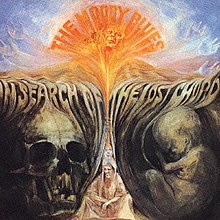Departure (The Moody Blues song)
| In Search of the Lost Chord | ||||
|---|---|---|---|---|
 |
||||
| Studio album by The Moody Blues | ||||
| Released | 26 July 1968 | |||
| Recorded | January–June 1968 | |||
| Studio | Decca Studios, West Hampstead, London | |||
| Genre | Progressive rock, psychedelic rock | |||
| Length | 42:07 | |||
| Label | Deram | |||
| Producer | Tony Clarke | |||
| The Moody Blues chronology | ||||
|
||||
| Singles from In Search of the Lost Chord | ||||
|
||||
| Professional ratings | |
|---|---|
| Review scores | |
| Source | Rating |
| AllMusic | |
| Rolling Stone | (mixed) |
In Search of the Lost Chord is the third album by The Moody Blues, released in July 1968 on the Deram label.
In Search of the Lost Chord is a concept album around a broad theme of quest and discovery, including world exploration ("Dr. Livingstone, I Presume"), music and philosophy through the ages ("House of Four Doors"), lost love ("The Actor"), spiritual development ("Voices in the Sky"), knowledge in a changing world ("Ride My See-Saw"), higher consciousness ("Legend of a Mind"), imagination ("The Best Way to Travel"), and space exploration ("Departure"). Space exploration would go on to become the theme of the Moodies' 1969 album To Our Children's Children's Children, inspired by and dedicated to the Apollo 11 mission. The mysterious "lost chord" of the title is revealed to be the mantra "Om" (in the last stanza of Graeme Edge's poem "The Word"). According to keyboardist Mike Pinder, the title was inspired by Jimmy Durante's humorous song, "I'm the Guy that Found the Lost Chord," itself a reference to "The Lost Chord" by Sir Arthur Sullivan.
Sessions for the album commenced in January 1968 with the recording of Thomas's "Legend of a Mind." Whereas the London Festival Orchestra had supplemented the group on Days of Future Passed, the Moody Blues played all instruments themselves (approximately 33) on In Search of the Lost Chord. Indian instruments such as the sitar (played by guitarist Justin Hayward), the tambura (played by keyboardist Mike Pinder) and the tabla (played by drummer and percussionist Graeme Edge) made audio appearances on several tracks (notably "Departure", "Visions of Paradise" and "Om"). Other unconventional (for the Moodies) instruments were also used, notably the oboe (played by percussionist/flute player Ray Thomas) and the cello (played by bassist John Lodge, who tuned it as a bass guitar). The mellotron, played by Pinder, produced many string and horn embellishments.
...
Wikipedia
